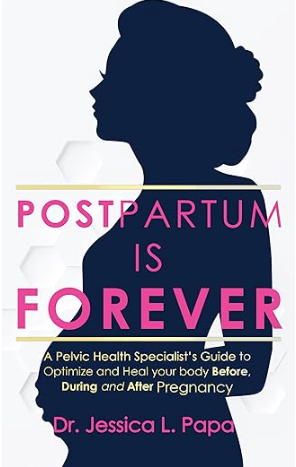Get It Girl! But Without The Pain: Dyspareunia
Here’s an except from Dr. Jess’s book, Postpartum Is Forever, exploring a topic that many experience but few talk about: dyspareunia, or painful sex.
While the book is grounded in the postpartum experience, it’s not just for new moms. This book is for anyone with a pelvis, anyone navigating life after birth, trauma, hormonal shifts, or changes in sexual health.
by Dr. Jessica L. Papa
“Life is full of simple pleasures…or great big ones. When sex becomes painful, it becomes a problem physically and mentally. Many of us believe that pain or discomfort during sex is to be expected at a certain point in our life. This is untrue. Sex should be pleasurable. I am here to explain exactly why your sex life shouldn’t stay between the sheets.
Dyspareunia, or painful intercourse, can be because of a range of different reasons, including psychological concerns to structural problems. Many women experience painful intercourse at some point in their lives. It can be defined as recurrent or persistent genital pain that occurs either just before or during intercourse. Oftentimes, pelvic dysfunction plays a role in this condition.
Did you know that a whopping 84% of us experience painful intercourse following the birth of our children?! This isn’t surprising considering what our abdominal and pelvic floor muscles go through during a C-section or vaginal delivery. We need time to heal. At least 6-8+ weeks to be exact. But after our scars have healed and we are “cleared” for sex by our OBGYN or midwife, oftentimes, our bodies are still not ready for sex. Take home message, ladies: you are not “damaged” if intercourse is still painful after your 6-week check up. It will get better.
Symptoms of dyspareunia are:
throbbing pain that lasts for hours after intercourse
burning or aching pain
deep pain during thrusting
pain with penetration, even putting in a tampon
pain only at penetration
Factors to Consider:
Medications: they may be a major culprit ! Birth control, blood pressure, and allergy meds may cause vaginal dryness.
Anxiety or depression can affect both libido and sexual arousal.
Conditions such as IBS, past surgical history, ovarian cysts can play a role as well.
Lack of estrogen during breastfeeding, early postpartum as well as during menopause can lead to vaginal dryness, thinning of the vaginal tissues, and decreased libido.
History of sexual abuse or other emotional factors.
Physical Causes
Although the problem can affect both men and women, it is more common in women. Women with dyspareunia have pain in the labia, clitoris, and vagina. If the pain is acute and occurs because of deep penetration, it can be because of a medical treatment or medical condition, such as:
Hysterectomy and other pelvic surgery
Some cancer treatments
Vaginal Dryness
Atrophic vaginitis, which is a common condition in postmenopausal women that causes thinning of the vaginal lining
Side effects of drugs, such as tamoxifen and antihistamines
Allergic reaction to douches, spermicides, and clothing
Endometriosis, which is a painful condition that causes the tissue of the uterine lining to migrate and grow abnormally inside the pelvis
Valvular vestibulitis, inflammation of the area that surrounds the vaginal opening
Skin diseases affecting the vaginal area, for example, lichen sclerosus and lichen planus
Sexually transmitted diseases, vaginal yeast infection, and urinary tract infections
Trauma that often stems from a history of sexual trauma or abuse
Cystitis or inflammation of the bladder wall because of a bladder infection
Fibroids or non-cancerous tumors growing on the wall of the uterus
Irritable bowel syndrome (IBS), which is a disorder of the gastrointestinal tract
Ovarian cysts, which are cysts resulting from a buildup of fluid inside the ovary
Pelvic inflammatory disease (PID)- PID is an inflammation of the female reproductive organs because of an infection
Uterine prolapse or a condition in which the pelvic organs extend into the vagina
Psychological Causes
Depression, fear, and anxiety contribute to vaginal dryness and can inhibit sexual arousal
In addition to this, stress can also trigger tightening of the pelvic floor muscles that results in pain
Psychological trauma
Diagnosis
Dyspareunia can be diagnosed based on the presenting symptoms. Your medical and sexual history along with a physical examination will help the doctor determine the cause of pain during intercourse. A common presenting complaint of dyspareunia is pain on touching the genitals, early and deeper penetration. The doctor will assess the symptoms and ask questions about the exact location, length, and time of the pain.
So what can be done? Check the list of side effects on your medication bottles. Talk to your primary care physician about alternative medication options. Find a mental health counselor in your area. Find a pelvic floor physical therapist who can help you find the root cause of your painful intercourse. This isn’t something you have to live with forever. This doesn’t have to be a taboo topic to discuss. There are healthcare professionals, like myself, who can help you on your healing journey towards great sex.”
If you enjoyed reading this excerpt, we hope you continue reading by purchasing the book here.
And for those who have read it, if this book made you feel seen, heard, or validated whether for yourself or a loved one, please consider leaving a review. Your words can help others feel supported as they navigate their own healing journey.


